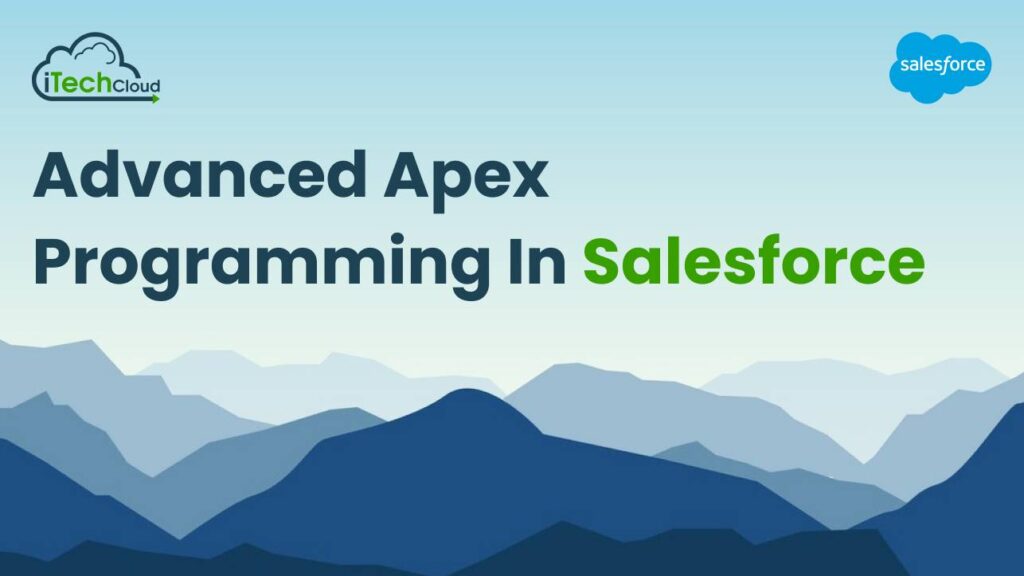Advanced Apex Programming in Salesforce

Advanced Apex Programming in Salesforce is a comprehensive guide designed to elevate developers’ proficiency in Salesforce’s Apex programming language. Through in-depth exploration of advanced topics like asynchronous processing, dynamic Apex, and design patterns, it equips readers with the expertise to build robust, scalable applications. The book offers practical examples, best practices, and strategies for optimizing performance and integrating with external systems. With its focus on intricate development challenges, this resource empowers developers to create high-quality solutions tailored to meet the demands of complex Salesforce environments.
Table of Contents
Overview of Salesforce and Advanced Apex:
Salesforce is a leading cloud-based CRM platform enabling businesses to manage sales, marketing, and customer service. Integral to Salesforce is Apex, a robust, object-oriented programming language. Advanced Apex allows developers to create custom logic and extend Salesforce functionalities through triggers, classes, and APIs. With its similarity to Java, developers can manipulate data, automate processes, and integrate with external systems. Salesforce’s flexibility and scalability, combined with Apex’s capabilities, empower organizations to tailor CRM solutions to their specific requirements, driving efficiency and growth in their operations.
Advanced Apex Concepts:
Advanced Apex concepts are crucial for Salesforce developers seeking to build scalable, efficient, and maintainable applications on the Salesforce platform. These concepts extend beyond basic syntax and cover a range of topics, including design patterns, asynchronous processing, integration, testing, security, performance optimization, packaging, and deployment. Mastering these concepts empowers developers to tackle complex development challenges and unlock the full potential of the Salesforce platform.
1. Design Patterns:
Design patterns provide reusable solutions to common software design problems, promoting code reusability, scalability, and maintainability. In Salesforce development, various design patterns, such as Singleton, Factory, and MVC (Model-View-Controller), can be applied to address different architectural concerns. Understanding when and how to implement these patterns effectively is essential for building robust and extensible applications.
2. Asynchronous Apex:
Asynchronous Apex enables developers to execute long-running processes asynchronously, improving application performance and scalability. Different asynchronous execution mechanisms, including future methods, batch processing, and queueable jobs, cater to diverse use cases. Best practices for handling large datasets, optimizing performance, and managing asynchronous job execution ensure efficient utilization of resources and enhance application responsiveness.
3. Integration:
Advanced integration techniques, such as REST and SOAP web services, callouts, and platform events, facilitate seamless communication between Salesforce and external systems. Authentication mechanisms, error handling strategies, and data synchronization approaches ensure secure and reliable integration, enabling organizations to leverage Salesforce as a central hub for data and processes.
4. Testing and Debugging:
Effective testing and debugging practices are essential for maintaining code quality and reliability. Various testing methodologies, including unit testing, integration testing, and test-driven development (TDD), help identify and prevent defects early in the development lifecycle. Advanced debugging techniques, such as logging, checkpoints, and debug logs analysis, aid in troubleshooting complex issues and optimizing code performance.
5. Security and Governor Limits:
Security is paramount in Salesforce development due to the sensitivity of data stored in the platform. Adhering to security best practices, such as data access controls, encryption, and authentication mechanisms, safeguards Salesforce applications against unauthorized access and data breaches. Additionally, understanding and optimizing governor limits imposed by the Salesforce platform ensure compliance with platform constraints and enhance application performance.
6. Performance Optimization:
Optimizing code performance is crucial for delivering responsive and scalable applications on Salesforce. Techniques for improving query performance, reducing Advanced Apex execution time, and minimizing resource consumption enhance application responsiveness and user experience. Strategies for optimizing SOQL queries, bulk processing operations, and governor limit utilization optimize resource utilization and ensure efficient application execution.
7. Packaging and Deployment:
Packaging and deploying Advanced Apex code require careful planning and management to ensure smooth deployment and version control. Best practices for packaging Apex code, managing dependencies, and deploying applications using tools like Salesforce DX streamline the development lifecycle and facilitate collaboration among development teams. Versioning, release management, and continuous integration/continuous deployment (CI/CD) practices enable organizations to deliver high-quality applications with confidence and agility.
8. Advanced Topics:
Advanced topics such as dynamic Advanced Apex, metadata API, and custom metadata types expand the capabilities of Salesforce developers. Leveraging dynamic Apex enables developers to create dynamic queries and manipulate Salesforce metadata at runtime, enhancing application flexibility and extensibility. The metadata API allows programmatically accessing and modifying Salesforce configuration metadata, enabling advanced customization and automation. Custom metadata types provide a mechanism for building customizable and flexible applications, empowering organizations to adapt to changing business requirements seamlessly.
Conclusion:
Advanced Apex Programming in Salesforce by Dan Appleman is an indispensable resource for experienced Salesforce developers seeking to elevate their skills and tackle complex development challenges. Covering a wide range of advanced concepts, including design patterns, asynchronous processing, integration, testing, security, performance optimization, packaging, and deployment, the book equips developers with the knowledge and tools needed to build scalable, efficient, and maintainable applications on the Salesforce platform.
By providing practical insights, real-world examples, and best practices, Appleman empowers developers to leverage the full power of Apex and Salesforce to deliver impactful solutions that drive business success. Whether aiming to optimize performance, integrate with external systems, or implement complex business logic, this book serves as a comprehensive guide, enabling developers to excel in their Salesforce development endeavors and stay ahead in the rapidly evolving ecosystem of cloud-based CRM solutions.

